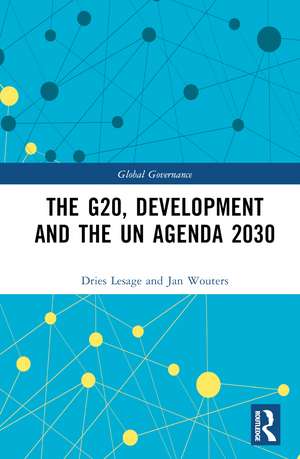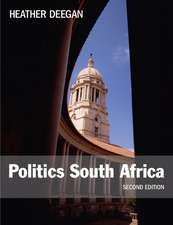The G20, Development and the UN Agenda 2030: Global Governance
Editat de Dries Lesage, Jan Woutersen Limba Engleză Hardback – 30 dec 2022
Providing context and a history of the G20’s involvement in development governance, expert international contributors consider the outcome of major conferences, the perspectives of China, India, and the EU, the shift away from positions held by Western countries and the role of civil society. They also offer in-depth analysis of the G20’s engagement with issues concerning infrastructure, food and agriculture, taxation, macro-economic policy and the Sustainable Development Goals.
The book will be of interest to scholars and students of development, international organisations and global governance.
| Toate formatele și edițiile | Preț | Express |
|---|---|---|
| Paperback (1) | 311.66 lei 3-5 săpt. | +23.54 lei 7-13 zile |
| Taylor & Francis – 26 aug 2024 | 311.66 lei 3-5 săpt. | +23.54 lei 7-13 zile |
| Hardback (1) | 711.82 lei 6-8 săpt. | |
| Taylor & Francis – 30 dec 2022 | 711.82 lei 6-8 săpt. |
Din seria Global Governance
-
 Preț: 379.79 lei
Preț: 379.79 lei -
 Preț: 311.66 lei
Preț: 311.66 lei -
 Preț: 388.68 lei
Preț: 388.68 lei -
 Preț: 386.51 lei
Preț: 386.51 lei - 17%
 Preț: 259.10 lei
Preț: 259.10 lei -
 Preț: 390.03 lei
Preț: 390.03 lei - 30%
 Preț: 769.37 lei
Preț: 769.37 lei -
 Preț: 384.70 lei
Preț: 384.70 lei -
 Preț: 388.90 lei
Preț: 388.90 lei -
 Preț: 382.54 lei
Preț: 382.54 lei -
 Preț: 389.66 lei
Preț: 389.66 lei -
 Preț: 384.09 lei
Preț: 384.09 lei -
 Preț: 380.25 lei
Preț: 380.25 lei - 17%
 Preț: 259.98 lei
Preț: 259.98 lei -
 Preț: 389.31 lei
Preț: 389.31 lei -
 Preț: 389.07 lei
Preț: 389.07 lei -
 Preț: 384.86 lei
Preț: 384.86 lei - 18%
 Preț: 1001.51 lei
Preț: 1001.51 lei -
 Preț: 392.54 lei
Preț: 392.54 lei - 17%
 Preț: 259.98 lei
Preț: 259.98 lei - 20%
 Preț: 259.98 lei
Preț: 259.98 lei - 18%
 Preț: 1000.27 lei
Preț: 1000.27 lei - 9%
 Preț: 936.25 lei
Preț: 936.25 lei - 18%
 Preț: 939.50 lei
Preț: 939.50 lei
Preț: 711.82 lei
Preț vechi: 953.97 lei
-25% Nou
Puncte Express: 1068
Preț estimativ în valută:
136.20€ • 142.21$ • 112.73£
136.20€ • 142.21$ • 112.73£
Carte tipărită la comandă
Livrare economică 04-18 aprilie
Preluare comenzi: 021 569.72.76
Specificații
ISBN-13: 9781472475213
ISBN-10: 1472475216
Pagini: 258
Ilustrații: 18
Dimensiuni: 156 x 234 mm
Greutate: 0.64 kg
Ediția:1
Editura: Taylor & Francis
Colecția Routledge
Seria Global Governance
Locul publicării:Oxford, United Kingdom
ISBN-10: 1472475216
Pagini: 258
Ilustrații: 18
Dimensiuni: 156 x 234 mm
Greutate: 0.64 kg
Ediția:1
Editura: Taylor & Francis
Colecția Routledge
Seria Global Governance
Locul publicării:Oxford, United Kingdom
Notă biografică
Dries Lesage is Associate Professor at the Ghent Institute for International and European Studies (GIES) at Ghent University.
Jan Wouters is Full Professor of International Law and International Organizations, Jean Monnet Chair and founding Director of the Institute for International Law and of the Leuven Centre for Global Governance Studies, at KU Leuven.
Jan Wouters is Full Professor of International Law and International Organizations, Jean Monnet Chair and founding Director of the Institute for International Law and of the Leuven Centre for Global Governance Studies, at KU Leuven.
Cuprins
Introduction: The G20, Development and the UN 2030 Agenda PART I: Context and Paradigms 1 G20 Development Governance 2 G20 Sustainable Development Governance: Epistemic, Normative, and Political Influences 3 The G20’s Contribution to Sustainable Development: A Perspective from China 4 The Indian Approach to the G20 Development Policy Track 5 How Close Is the European Consensus to the Seoul Consensus? Evolving EU Development Policy Discourse 6 Input Legitimacy of the G20 Development Policy Track PART II: Themes and Outcomes 7 The Multiple Roles of the G20 with Regard to the UN Sustainable Development Goals 8 Infrastructure at the G20 9 G20 Failure to Take the Leadership it Claims to Respond to the Food Crisis 10 The G20’s Orchestrating Role on Tax and Development 11 The G20 and the Poorest Countries in the Aftermath of the Global Financial Crisis
Recenzii
Global governance arrangements connect the rarefied world of international diplomacy to the reality of life in the world’s slums and villages. The West to East shift in power and influence perturbed the existing balance between the G7 and the United Nations as the premier geopolitical and normative powerbrokers, respectively. In this weighty and realistic yet ultimately optimistic book, contributors explore the record to date and the future potential of the G20 as the site and grouping that can mediate the competing demands of efficiency, effectiveness and legitimacy with respect to the development and UN 2030 agenda. Highly recommended.
- Ramesh Thakur, Australian National University, former UN Assistant Secretary-General and co-author of The Group of Twenty (G20).
This theoretically sophisticated and analytically elegant volume provocatively examines the role of the G-20 in developing a new global aid regime that provides greater space for the self-determination of key Southern actors in shaping the emerging development co-operation narrative. Departing from typical empirically-driven academic writing, the authors of this edited collection offer refreshing accounts of how the nexus of history, political economy, and shifting power dynamics have enabled Southern actors, including civil society groups, to present an alternative aid architecture.
- Fahim Quadir (he/him), PhD Vice-Provost and Dean, School of Graduate Studies and Postdoctoral Affairs
Professor, Global Developmental Studies
This edited collection by Dries Lesage and Jan Wouters provides compelling support for G20 centrality in international relations. Instead of a focus on the role of leaders, the summit process is interpreted as a site for innovative practices exemplified by illustrations in the development arena. From this recalibrated analysis the G20 is positioned as a hub forum that notwithstanding its self-selective character connects to universal policy initiatives, above all the UN 2030 Agenda and the SDGs. Although appreciating the complex political and technical barriers to policy success, the book underscores the sustained salience of the G20 to undertake fundamental reform within specific key domains. Both because of the detailed expertise of its contributors, and its willingness to engage with core themes related to global governance, the collection deserves a wide readership.
- Andrew F. Cooper, University Research Chair, Department of Political Science, and Professor, the Balsillie School of International Affairs, University of Waterloo. Associate Research Fellow-UNU CRIS (Institute on Comparative Regional Integration), Bruges, Belgium.
- Ramesh Thakur, Australian National University, former UN Assistant Secretary-General and co-author of The Group of Twenty (G20).
This theoretically sophisticated and analytically elegant volume provocatively examines the role of the G-20 in developing a new global aid regime that provides greater space for the self-determination of key Southern actors in shaping the emerging development co-operation narrative. Departing from typical empirically-driven academic writing, the authors of this edited collection offer refreshing accounts of how the nexus of history, political economy, and shifting power dynamics have enabled Southern actors, including civil society groups, to present an alternative aid architecture.
- Fahim Quadir (he/him), PhD Vice-Provost and Dean, School of Graduate Studies and Postdoctoral Affairs
Professor, Global Developmental Studies
This edited collection by Dries Lesage and Jan Wouters provides compelling support for G20 centrality in international relations. Instead of a focus on the role of leaders, the summit process is interpreted as a site for innovative practices exemplified by illustrations in the development arena. From this recalibrated analysis the G20 is positioned as a hub forum that notwithstanding its self-selective character connects to universal policy initiatives, above all the UN 2030 Agenda and the SDGs. Although appreciating the complex political and technical barriers to policy success, the book underscores the sustained salience of the G20 to undertake fundamental reform within specific key domains. Both because of the detailed expertise of its contributors, and its willingness to engage with core themes related to global governance, the collection deserves a wide readership.
- Andrew F. Cooper, University Research Chair, Department of Political Science, and Professor, the Balsillie School of International Affairs, University of Waterloo. Associate Research Fellow-UNU CRIS (Institute on Comparative Regional Integration), Bruges, Belgium.
Descriere
This book offers a unique assessment of the G20’s development agenda and its potential to be an impactful actor in the global architecture of development cooperation.













